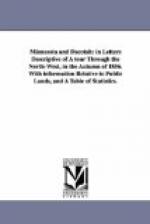“Early in the morning they attacked the Sioux in their camp, who, immediately sallying out upon them, forced them back to the last place of retreat they had resolved upon. They fought desperately. More than twice their own number were killed before they had lost their lives. Eight of them were tomahawked in the holes to which they had retreated; the other four fell on the field. The thirteenth returned home, according to the directions he had received, and related the foregoing circumstances to his tribe. They mourned their death; but delighted with the bravery of their friends, unexampled in modern times, they were happy in their grief.
“This account I received of the very Indian who was of the party and had escaped.”— [See Schoolcraft, p. 481.][1]
[1 Pride is a characteristic trait in Indian character. On a recent occasion when several bands of the Chippewas were at Washington to negotiate a treaty with the United States, they had an interview with their Great Father the President. He received them in the spacious East Room of the executive mansion, in the presence of a large collection of gentlemen who had gathered to witness the occasion. Each chief made a speech to the President, which was interpreted as they spoke. When it came to the turn of Eshkibogikoj (Flat Mouth) that venerable chief began with great dignity, saying: “Father! Two great men have met!” Here he paused to let the sentence be interpreted. His exordium amused not only the whites but the Indians.]
In the contest between the Athenians and the Dorians, an oracle had declared that the side would triumph whose king should fall. Codrus the Athenian king, to be more sure of sacrificing himself, assumed the dress of a peasant, and was soon killed; and the event soon spread dismay among the enemies of Athens. His patriotism was accounted so great, that the Athenians declared that there was no man worthy to be his successor, and so abolished the monarchy. I think the history of the Indians would show instances of heroism as praiseworthy as can be found in the annals of the ancients. Let it be remembered, too, that the Spartans knew that an imperishable literature would hand down their valor to the praise of the world through all the future. But the Indian looked for the preservation of his exploits only in the songs and the traditional stories of his tribe.




